Select a section on the map below to view details about the rose varieties it contains or view a full list of all sections below the map.
Full List of Sections
Section S1
- Type: Shrub
- Color: Mauve & Mauve Blend
- Fragrance: Mild
- Height: 3'-5'
- Width: 2'-7'
- Petals: Semi-Double (9-16)
- Bloom Form: Large Clusters
- USDA Zones: 6b - 9b
- Year Introduced: 2003
- Type: Floribunda
- Color: Deep Red
- Fragrance: Mild
- Height: 4'-6'
- Width: 5'-6'
- Petals: Double (17-25)
- Bloom Form: Large Clusters
- USDA Zones: 5b and warmer
- Year Introduced: 2012
Section S2
- Type: Shrub
- Color: Light Pink
- Fragrance: Mild
- Height: 4'-5'
- Petals: Semi-Double (9-16)
- Bloom Form: Large Clusters
- USDA Zones: 6b to 9b
- Year Introduced: 2000
- Type: Shrub
- Color: Red Blend
- Fragrance: Mild
- Height: 4'-5'
- Width: 3'-4'
- Petals: Double (17-25)
- Bloom Form: Small Clusters
- USDA Zones: 6b-9b
- Year Introduced: 2001
- Type: Shrub
- Color: Orange Pink & Orange Pink Blend
- Fragrance: Moderate
- Height: Up to 3'
- Width: Up to 3'
- Petals: Semi-Double (9-16)
- Bloom Form: Small Clusters
- USDA Zones: 5a - 9b
- Year Introduced: 2002
Section S3
- Type: Shrub
- Color: Light Pink
- Fragrance: Moderate
- Height: Up to 4'
- Width: Up to 3'
- Petals: Very Full (41+)
- Bloom Form: Small Clusters
- USDA Zones: 5b to 10b
- Year Introduced: 1994
- Type: Shrub
- Color: Light Pink
- Fragrance: Strong
- Height: Up to 4'
- Width: Up to 3'
- Petals: Full (26-40)
- Bloom Form: Small Clusters
- USDA Zones: 4b - 9b
- Year Introduced: 2005
- Type: Shrub
- Color: Medium Pink
- Fragrance: Strong
- Height: Up to 4'
- Petals: Very Full (41+)
- Bloom Form: Small Clusters
- USDA Zones: 6b to 9b
- Year Introduced: 2004
- Type: Shrub
- Color: Deep Red
- Fragrance: Strong
- Height: Up to 3'
- Petals: Very Full (41+)
- Bloom Form: Small Clusters
- USDA Zones: 5b -11
- Year Introduced: 2008
- Type: Shrub
- Color: Medium Pink
- Fragrance: Strong
- Height: Up to 4'
- Width: Up to 3'
- Petals: Very Full (41+)
- Bloom Form: Small Clusters
- USDA Zones: 4b - 8b
- Year Introduced: 2008
- Type: Shrub
- Color: Deep Pink
- Fragrance: Mild
- Height: 3'-5'
- Width: 3'-4'
- Petals: Very Full (41+)
- Bloom Form: Mostly Solitary
- USDA Zones: 5b- 10b
- Year Introduced: 2000
- Type: Shrub
- Color: Crimson
- Fragrance: Moderate
- Height: 3'-4'
- Width: 4'-5'
- Petals: Very Full (41+)
- Bloom Form: Small Clusters
- USDA Zones: 5b -10b
- Year Introduced: 1994
Section S4
- Type: Hybrid Tea
- Color: Apricot
- Fragrance: Moderate
- Height: 5'-6'
- Width: 2'-3'
- Petals: Double (17-25)
- Bloom Form: Small Clusters
- USDA Zones: 6b to 9b
- Year Introduced: 2007
- Type: Hybrid Tea
- Color: Apricot & Apricot Blend
- Fragrance: Mild
- Height: 3'-5'
- Width: Up to 2'
- Petals: Double (17-25)
- Bloom Form: Mostly Solitary
- USDA Zones: 6b -9b
- Year Introduced: 2008
- Type: Floribunda
- Color: Orange & Orange Blend
- Fragrance: Mild
- Height: 3'- 4'
- Width: Up to 3'
- Petals: Double (17-25)
- Bloom Form: Large Clusters
- USDA Zones: 6b and warmer
- Year Introduced: 2001
- Type: Floribunda
- Color: Deep Yellow
- Fragrance: Strong
- Height: 4'-5'
- Width: 6' -7'
- Petals: Full (26-40)
- Bloom Form: Mostly Solitary
- USDA Zones: 6 - 10
- Year Introduced: 2012
Section S5
- Type: Floribunda
- Color: White
- Fragrance: Mild
- Height: 3'-4'
- Width: Up to 3'
- Petals: Double (17-25)
- Bloom Form: Large Clusters
- USDA Zones: 5a to 9b
- Year Introduced: 2016
- Type: Floribunda
- Color: Yellow Blend
- Fragrance: None
- Height: 4'-5'
- Width: 3'- 4'
- Petals: Double (17-25)
- Bloom Form: Mostly Solitary
- USDA Zones: 6b - 9b
- Year Introduced: 2006
- Type: Floribunda
- Color: White & White Blend
- Fragrance: None
- Height: 3'-4'
- Width: 2'-3'
- Petals: Full (26-40)
- Bloom Form: Small Clusters
- USDA Zones: 6b to 9b
- Year Introduced: 2003
- Type: Grandiflora
- Color: Yellow Blend
- Fragrance: Strong
- Height: 5' -7'
- Width: 1'-2'
- Petals: Full (26-40)
- Bloom Form: Large Clusters
- USDA Zones: 5b and warmer
- Year Introduced: 2007
Section S6
- Type: Floribunda
- Color: Rust
- Fragrance: Moderate
- Height: 3' -6'
- Width: Up to 4'
- Petals: Full (26-40)
- Bloom Form: Small Clusters
- USDA Zones: 6b and warmer
- Year Introduced: 2003
- Type: Floribunda
- Color: Mauve & Mauve Blend
- Fragrance: Mild
- Height: 3'-5'
- Width: 2'-4'
- Petals: Very Full (41+)
- Bloom Form: Small Clusters
- USDA Zones: 7a and warmer
- Year Introduced: 2012
- Type: Floribunda
- Color: Pink Blend
- Fragrance: Mild
- Height: 2'- 3'
- Width: Up to 2'
- Petals: Double (17-25)
- Bloom Form: Solitary
- USDA Zones: 5 to 9
- Year Introduced: 2020
Section S7
- Type: Floribunda
- Color: Lavender & Red Orange
- Fragrance: Mild
- Height: 4'-5'
- Width: 4'-5'
- Petals: Double (17-25)
- Bloom Form: Small Clusters
- USDA Zones: 6b -9b
- Year Introduced: 2006
Section S8
- Type: Floribunda
- Color: Pink Blend
- Fragrance: Mild
- Height: Up to 4'
- Width: Up to 3'
- Petals: Double (17-25)
- Bloom Form: Small Clusters
- USDA Zones: 6b -9b
- Year Introduced: 2008
- Type: Floribunda
- Color: Medium Yellow
- Fragrance: Mild
- Width: 3'-4'
- Petals: Double (17-25)
- Bloom Form: Small Clusters
- USDA Zones: 6b -10b
- Year Introduced: 2008
Section S9
- Type: Floribunda
- Color: Medium Yellow
- Fragrance: Moderate
- Height: 4'-5'
- Width: 4'-5'
- Petals: Full (26-40)
- Bloom Form: Small Clusters
- USDA Zones: 6 - 10
- Year Introduced: 2014
- Type: Shrub
- Color: Medium Red
- Fragrance: Mild
- Height: 2'- 3'
- Petals: Single (4-8)
- Bloom Form: Small Clusters
- USDA Zones: 6b -9b
- Year Introduced: 2006
- Type: Floribunda
- Color: Mauve & Mauve Blend
- Fragrance: Mild
- Height: 4'-5'
- Width: 2'-3'
- Petals: Very Full (41+)
- Bloom Form: Small Clusters
- USDA Zones: 5b and warmer
- Year Introduced: 2013
- Type: Floribunda
- Color: Medium Yellow
- Fragrance: Mild
- Height: 2'-4'
- Width: 3'
- Petals: Double (17-25)
- Bloom Form: Mostly Solitary
- USDA Zones: 6b and warmer
- Year Introduced: 1983
Section S10
- Type: Hybrid Tea
- Color: Deep Yellow
- Fragrance: Moderate
- Petals: Full (26-40)
- Bloom Form: Mostly Solitary
- Year Introduced: 1988
- Type: Grandiflora
- Color: Medium Yellow
- Fragrance: Mild
- Height: 3'- 6'
- Width: Up to 3'
- Petals: Full (26-40)
- Bloom Form: Mostly Solitary
- USDA Zones: 7b and warmer
- Year Introduced: 1982
- Type: Hybrid Tea
- Color: White & White Blend
- Fragrance: Mild
- Height: 4'-5'
- Petals: Double (17-25)
- Bloom Form: Mostly Solitary
- USDA Zones: 7b and warmer
- Year Introduced: 1980
- Type: Floribunda
- Color: Red & White
- Fragrance: Moderate
- Height: Up to 3'
- Width: 1'-2'
- Petals: Double (17-25)
- Bloom Form: Solitary
- USDA Zones: 6b -9b
- Year Introduced: 2019
Section S11
- Type: Grandiflora
- Color: Red Blend
- Fragrance: Mild
- Height: 2'-3'
- Width: Up to 3'
- Petals: Full (26-40)
- Bloom Form: Large Clusters
- USDA Zones: 6b and warmer
- Year Introduced: 2000
- Type: Hybrid Tea
- Color: Yellow
- Fragrance: Strong
- Height: 4'-5'
- Width: 2'-3'
- Petals: Full (26-40)
- Bloom Form: Mostly Solitary
- USDA Zones: 6b -9b
- Year Introduced: 1955
- Type: Floribunda
- Color: Red and Yellow
- Fragrance: Mild
- Height: 4'-5'
- Width: 2'-3'
- Petals: Double (17-25)
- Bloom Form: Small Clusters
- USDA Zones: 6 -9
- Year Introduced: 2012
Section C1
- Type: Grandiflora
- Color: Medium Yellow
- Fragrance: Mild
- Height: 2'-6'
- Width: 3'
- Petals: Full (26-40)
- Bloom Form: Mostly Solitary
- USDA Zones: 7b and warmer
- Year Introduced: 1982
- Type: Hybrid Tea
- Color: Pink and Yellow Blend
- Fragrance: Strong
- Height: 4'-6'
- Width: Up to 3'
- Petals: Very Full (41+)
- Bloom Form: Solitary
- USDA Zones: 5b and warmer
- Year Introduced: 1945
- Type: Hybrid Tea
- Color: Deep Orange
- Fragrance: Mild
- Height: 4'-6'
- Width: 3'
- Petals: Double (17-25)
- Bloom Form: Mostly Solitary
- USDA Zones: 6-9
- Year Introduced: 2017
- Type: Floribunda
- Color: Yellow
- Fragrance: Strong
- Height: 3"
- Width: 2"-3"
- Petals: Double (17-25)
- Bloom Form: Small Clusters
- USDA Zones: 5-9
- Year Introduced: 1973
Section C2A
- Type: Grandiflora
- Color: Pink and Orange Blend
- Fragrance: Moderate
- Height: 3'-5'
- Petals: Full (26-40)
- Bloom Form: Mostly Solitary
- USDA Zones: 6-10
- Year Introduced: 2013
- Type: Hybrid Tea
- Color: Pink Blend
- Fragrance: Strong
- Height: 6'-8'
- Width: 6'-7'
- Petals: Full (26-40)
- Bloom Form: Mostly Solitary
- USDA Zones: 4b and warmer
- Year Introduced: 2014
- Type: Shrub
- Color: Red Blend
- Fragrance: Mild
- Height: 4'-5'
- Width: 4'-5'
- Petals: Very Full (41+)
- Bloom Form: Large Clusters
- USDA Zones: 6b-9b
- Year Introduced: 1997
- Type: Miniature
- Color: Yellow Blend
- Fragrance: None
- Height: 1'-2'
- Petals: Double (17-25)
- Bloom Form: Small Clusters
- USDA Zones: 6b-9b
- Year Introduced: 2008
Section C2B
- Type: Large Flowered Climber
- Color: Red Blend
- Fragrance: Moderate
- Height: 4'-15'
- Width: 2'-6'
- Petals: Semi-Double (9-16)
- Bloom Form: Large Clusters
- USDA Zones: 6a-9b
- Year Introduced: 1999
- Type: Floribunda
- Color: Yellow Blend
- Fragrance: Moderate
- Height: 2'-3'
- Petals: Full (26-40)
- Bloom Form: Small Clusters
- USDA Zones: 3b-10b
- Year Introduced: 1997
- Type: Floribunda
- Color: Red and Yellow
- Fragrance: Mild
- Height: 4'-5'
- Width: 2'-3'
- Petals: Double (17-25)
- Bloom Form: Small Clusters
- USDA Zones: 6-9
- Year Introduced: 2012
- Type: Miniature
- Color: Red and Yellow
- Fragrance: None
- Height: 1'-2'
- Petals: Full (26-40)
- Bloom Form: Small Clusters
- USDA Zones: 4b-11
- Year Introduced: 1985
Section C3
- Type: Large Flowered Climber
- Color: Orange and Red Blend
- Fragrance: Moderate
- Height: 8'-12'
- Width: 4'
- Petals: Semi-Double (9-16)
- Bloom Form: Large Clusters
- USDA Zones: 4b-10b
- Year Introduced: 1964
- Type: Hybrid Tea
- Color: Deep Yellow
- Fragrance: Mild
- Height: 4'-5'
- Width: 4'-5'
- Petals: Very Full (41+)
- Bloom Form: Mostly Solitary
- USDA Zones: 7b and warmer
- Year Introduced: 2002
- Type: Floribunda
- Color: Orange Red Blend
- Fragrance: Mild
- Height: 2'-3'
- Width: 1'-2'
- Petals: Full (26-40)
- Bloom Form: Large Clusters
- USDA Zones: 6b and warmer
- Year Introduced: 1977
Section C4
- Type: Grandiflora
- Color: Orange and Red Blend
- Fragrance: Moderate
- Height: 3'-5'
- Petals: Full (26-40)
- Bloom Form: Mostly Solitary
- USDA Zones: 6-10
- Year Introduced: 2013
- Type: Shrub
- Color: White Blend
- Fragrance: Mild
- Height: 6'-12'
- Width: 3'-5'
- Petals: Single (4-8)
- Bloom Form: Large Clusters
- USDA Zones: 5b-9b
- Year Introduced: 1976
- Type: Grandiflora
- Color: Light Yellow
- Fragrance: None
- Height: 4'-5'
- Width: 3'-4'
- Petals: Full (26-40)
- Bloom Form: Small Clusters
- USDA Zones: 6-9
- Year Introduced: 2012
Section C5
- Type: Miniature
- Color: Yellow and Pink Blend
- Fragrance: Mild
- Height: 1'-2'
- Petals: Single (4-8)
- Bloom Form: Solitary
- USDA Zones: 6-9
- Year Introduced: 2014
- Type: Floribunda
- Color: Medium Yellow
- Fragrance: Mild
- Height: 4'-5'
- Petals: Full (26-40)
- Bloom Form: Small Clusters
- USDA Zones: 5b-10a
- Year Introduced: 2006
- Type: Grandiflora
- Color: Mauve
- Fragrance: Strong
- Height: 4'-5'
- Petals: Full (26-40)
- Bloom Form: Large Clusters
- USDA Zones: 5b and warmer
- Year Introduced: 1995
- Type: Hybrid Tea
- Color: Deep Yellow
- Fragrance: Moderate
- Height: 4'-5'
- Petals: Double (17-25)
- Bloom Form: Mostly Solitary
- USDA Zones: 7b and warmer
- Year Introduced: 1994
- Type: Floribunda
- Color: Hot Pink
- Fragrance: Moderate
- Height: 3'
- Width: 3.5'-4'
- Petals: Very Full (41+)
- Bloom Form: Solitary
- USDA Zones: 5 to 11
- Year Introduced: yes
Section N1
- Type: Floribunda
- Color: Medium Yellow
- Fragrance: Moderate
- Height: 2'- 3'
- Petals: Full (26-40)
- Bloom Form: Solitary
- USDA Zones: 7b and warmer
- Year Introduced: 1955
- Type: Hybrid Tea
- Color: White & white blend
- Fragrance: Mild
- Height: 5'-6'
- Petals: Full (26-40)
- Bloom Form: Mostly Solitary
- USDA Zones: 6b and warmer
- Year Introduced: 2003
Section N2
- Type: Floribunda
- Color: Medium Yellow
- Fragrance: Moderate
- Height: 2'-3'
- Petals: Full (26-40)
- Bloom Form: Solitary
- USDA Zones: 7b and warmer
- Year Introduced: 1955
- Type: Hybrid Tea
- Color: White & white blend
- Fragrance: Mild
- Height: 5'-6'
- Petals: Full (26-40)
- Bloom Form: Mostly Solitary
- USDA Zones: 6b and warmer
- Year Introduced: 2003
Section N3
- Type: Grandiflora
- Color: Orange blend
- Fragrance: Mild
- Height: 5'-6'
- Petals: Full (26-40)
- Bloom Form: Solitary
- USDA Zones: 6b-9b
- Year Introduced: 2003
- Type: Floribunda
- Color: Pink blend
- Fragrance: Moderate
- Height: 3'-5'
- Petals: Double (17-25)
- Bloom Form: Solitary
- USDA Zones: 6-10
- Year Introduced: 1991
- Type: Hybrid Tea
- Color: Shell pink
- Fragrance: Strong
- Height: 4'-7'
- Petals: Very Full (41+)
- Bloom Form: Solitary
- USDA Zones: 5 and above
- Year Introduced: 2008
- Type: Floribunda
- Color: Yellow blend
- Fragrance: Strong
- Height: 2'-3'
- Petals: Full (26-40)
- Bloom Form: Small Clusters
- USDA Zones: 6b and warmer
- Year Introduced: 1999
- Type: Floribunda
- Color: Medium yellow
- Fragrance: Mild
- Height: 3'-4'
- Petals: Full (26-40)
- Bloom Form: Solitary
- USDA Zones: 5-10
- Year Introduced: 2011
Section N4
- Type: Grandiflora
- Color: Deep Red
- Fragrance: Mild
- Height: 4'-5'
- Petals: Double (17-25)
- Bloom Form: Large Clusters
- USDA Zones: 7b and warmer
- Year Introduced: 2000
- Type: Hybrid Tea
- Color: Pink blend & orange blend
- Fragrance: Strong
- Height: 3'-5'
- Petals: Very Full (41+)
- Bloom Form: Mostly Solitary
- USDA Zones: 7b and warmer
- Year Introduced: 1997
- Type: Floribunda
- Color: Red blend
- Fragrance: Mild
- Height: 2.5'-4'
- Petals: Full (26-40)
- Bloom Form: Small Clusters
- USDA Zones: 4-10
- Year Introduced: 2018
Section N5A
- Type: Grandiflora
- Color: Red Blend
- Fragrance: Moderate
- Height: 6'-7'
- Petals: Full (26-40)
- Bloom Form: Mostly Solitary
- Year Introduced: 2011
- Type: Floribunda
- Color: Pink Blend
- Fragrance: Mild
- Height: 2'-3'
- Petals: Semi-Double (9-16)
- Bloom Form: Small Clusters
- USDA Zones: 6b-9b
- Year Introduced: 2007
- Type: Floribunda
- Color: Medium Red
- Fragrance: Mild
- Height: 3'-4'
- Petals: Double (17-25)
- Bloom Form: Mostly Solitary
- USDA Zones: 6b-9b
- Year Introduced: 2004
- Type: Shrub
- Color: Pink Blend
- Fragrance: None
- Height: 3'-4'
- Petals: Single (4-8)
- Bloom Form: Large Clusters
- Year Introduced: 2013
Section N5B
- Type: Hybrid Tea
- Color: Deep Pink
- Fragrance: Moderate
- Height: 6'-7'
- Petals: Very Full (41+)
- Bloom Form: Solitary
- Year Introduced: 2018
- Type: Hybrid Tea
- Color: Red Blend
- Fragrance: None
- Height: 3'-5'
- Petals: Full (26-40)
- Bloom Form: Mostly Solitary
- USDA Zones: 7b-10
- Year Introduced: 1976
- Type: Floribunda
- Color: Pink Blend
- Fragrance: Mild
- Height: 3'-4'
- Petals: Full (26-40)
- Bloom Form: Large Clusters
- Year Introduced: 2014
Section N5C
- Type: Hybrid Tea
- Color: Pink Blend
- Fragrance: Strong
- Height: 6'-8''
- Width: 6'-7'
- Petals: Very Full (41+)
- Bloom Form: Solitary
- USDA Zones: 4b and warmer
- Year Introduced: 2015
- Type: Floribunda
- Color: Medium Pink
- Fragrance: Mild
- Height: 4'-5'
- Petals: Semi-Double (9-16)
- Bloom Form: Large Clusters
- USDA Zones: 7b and warmer
- Year Introduced: 2001
- Type: Grandiflora
- Color: Deep Pink
- Fragrance: Mild
- Height: 1'-2'
- Petals: Full (26-40)
- Bloom Form: Solitary
- USDA Zones: 5-10
- Year Introduced: 2009
Section N6A
- Type: Hybrid Tea
- Color: Mauve Blend
- Fragrance: Strong
- Height: 3'-5'
- Petals: Full (26-40)
- Bloom Form: Solitary
- USDA Zones: 6a-10b
- Year Introduced: 2001
- Type: Hybrid Tea
- Color: Pink and Orange Blend
- Fragrance: Moderate
- Height: 3'-5'
- Petals: Full (26-40)
- Bloom Form: Mostly Solitary
- USDA Zones: 6b and warmer
- Year Introduced: 1991
- Type: Hybrid Tea
- Color: Pink Blend
- Fragrance: Mild
- Height: 3'-5'
- Petals: Full (26-40)
- Bloom Form: Mostly Solitary
- USDA Zones: 7b and warmer
- Year Introduced: 1995
- Type: Floribunda
- Color: Medium Red
- Fragrance: Mild
- Height: 1'-2'
- Petals: Double (17-25)
- Bloom Form: Large Clusters
- USDA Zones: 6b and warmer
- Year Introduced: 1981
Section N6B
- Type: Hybrid Tea
- Color: Pink and Orange Blend
- Fragrance: Moderate
- Height: 3'-5'
- Petals: Full (26-40)
- Bloom Form: Mostly Solitary
- USDA Zones: 6b and warmer
- Year Introduced: 1991
- Type: Floribunda
- Color: Orange Pink Blend
- Fragrance: Mild
- Height: 3'-4'
- Petals: Full (26-40)
- Bloom Form: Small Clusters
- Year Introduced: 2010
- Type: Hybrid Tea
- Color: Pink Blend
- Fragrance: Mild
- Height: 3'-5'
- Petals: Full (26-40)
- Bloom Form: Mostly Solitary
- USDA Zones: 7b and warmer
- Year Introduced: 1995
- Type: Hybrid Tea
- Color: Medium Red
- Fragrance: Mild
- Height: 3'-5'
- Petals: Full (26-40)
- Bloom Form: Mostly Solitary
- USDA Zones: 5b and warmer
- Year Introduced: 1985
Section N6C
- Type: Hybrid Tea
- Color: Pink and Orange Blend
- Fragrance: Moderate
- Height: 3'-5'
- Petals: Full (26-40)
- Bloom Form: Mostly Solitary
- USDA Zones: 6b and warmer
- Year Introduced: 1991
- Type: Grandiflora
- Color: Light Pink
- Fragrance: Mild
- Height: 3'-4'
- Petals: Double (17-25)
- Bloom Form: Small Clusters
- USDA Zones: 6b-9b
- Year Introduced: 2006
- Type: Hybrid Tea
- Color: Pink Blend
- Fragrance: Mild
- Height: 3'-5'
- Petals: Full (26-40)
- Bloom Form: Mostly Solitary
- USDA Zones: 7b and warmer
- Year Introduced: 1995
- Type: Floribunda
- Color: Medium Red
- Fragrance: Mild
- Height: 1'-2'
- Petals: Double (17-25)
- Bloom Form: Large Clusters
- USDA Zones: 6b and warmer
- Year Introduced: 1981
Section N7
- Type: Miniature
- Color: White & White Blend
- Fragrance: Mild
- Height: 1'- 2'
- Petals: Semi-Double (9-16)
- Bloom Form: Large Clusters
- USDA Zones: 5b and warmer
- Year Introduced: 1986
- Type: Polyantha
- Color: Medium Red
- Fragrance: Mild
- Height: 2' -3'
- Petals: Single (4-8)
- Bloom Form: Large Clusters
- USDA Zones: 6b to 9b
- Year Introduced: 2007
Section N8
- Type: Miniature
- Color: White & White Blend
- Fragrance: Mild
- Height: 1' -2'
- Petals: Semi-Double (9-16)
- Bloom Form: Large Clusters
- USDA Zones: 5b and warmer
- Year Introduced: 1986
- Type: Floribunda
- Color: Deep Red
- Fragrance: Mild
- Height: 2'- 3'
- Petals: Double (17-25)
- Bloom Form: Large Clusters
- USDA Zones: 5b and warmer
- Year Introduced: 1979
- Type: Polyantha
- Color: Medium Red
- Fragrance: Mild
- Height: 2'- 3'
- Petals: Single (4-8)
- Bloom Form: Large Clusters
- USDA Zones: 6b to 9b
- Year Introduced: 2007
Section N9A
- Type: Grandiflora
- Color: Mauve and Mauve Blend
- Fragrance: Strong
- Height: 2'- 4'
- Petals: Double (17-25)
- Bloom Form: Large Clusters
- USDA Zones: 5b to 10
- Year Introduced: 1990
- Type: Floribunda
- Color: Deep Yellow
- Fragrance: None
- Height: 2'-4'
- Petals: Double (17-25)
- Bloom Form: Small Clusters
- USDA Zones: 4 to 10
- Year Introduced: 2017
- Type: Grandiflora
- Color: Coral Pink
- Fragrance: Moderate
- Height: 2.5'-4'
- Petals: Very Full (41+)
- Bloom Form: Large Clusters
- USDA Zones: 5 to 9
- Year Introduced: 2022
Section N9B
- Type: Floribunda
- Color: Rust
- Fragrance: Mild
- Height: 2'-3'
- Petals: Double (17-25)
- Bloom Form: Small Clusters
- Year Introduced: 2009
Section N9C
- Type: Hybrid Tea
- Color: Deep Yellow
- Fragrance: Moderate
- Height: 4'-5'
- Petals: Double (17-25)
- Bloom Form: Mostly Solitary
- USDA Zones: 7b and warmer
- Year Introduced: 1994
- Type: Shrub
- Color: Mauve & Mauve Blend
- Fragrance: Moderate
- Height: 2'-3'
- Petals: Double (17-25)
- Bloom Form: Small Clusters
- USDA Zones: 5b to 9b
- Year Introduced: 2004
- Type: Grandiflora
- Color: Mauve & Mauve Blend
- Fragrance: Strong
- Height: 4'-5'
- Petals: Full (26-40)
- Bloom Form: Large Clusters
- USDA Zones: 5b to 9b
- Year Introduced: 2006
Section N9D
- Type: Shrub
- Color: Apricot & Apricot Blend
- Fragrance: None
- Height: 18"
- Petals: Full (26-40)
- Bloom Form: Small Clusters
- USDA Zones: 4b and warmer
- Year Introduced: 2010
- Type: Floribunda
- Color: Deep Plum Purple, Mauve
- Fragrance: Mild
- Height: 3'-4'
- Petals: Full (26-40)
- Bloom Form: Small Clusters
- Year Introduced: 2019
- Type: Hybrid Tea
- Color: Apricot & Apricot Blend
- Fragrance: Moderate
- Height: 3'- 4'
- Petals: Full (26-40)
- Bloom Form: Mostly Solitary
- Year Introduced: 2009
Section N9E
- Type: Floribunda
- Color: Deep Plum Purple, Mauve
- Fragrance: Mild
- Height: 3'- 4'
- Petals: Full (26-40)
- Bloom Form: Small Clusters
- Year Introduced: 2019
- Type: Hybrid Tea
- Color: Apricot & Apricot Blend
- Fragrance: Moderate
- Height: 3'-4'
- Petals: Full (26-40)
- Bloom Form: Mostly Solitary
- Year Introduced: 2009
- Type: Floribunda
- Color: Orange & Orange Blend
- Fragrance: Moderate
- Height: 3'-4'
- Petals: Full (26-40)
- Bloom Form: Mostly Solitary
- Year Introduced: 2018
Section N10A
- Type: Hybrid Tea
- Color: Pink & Yellow
- Fragrance: Moderate
- Height: 4'-5'
- Petals: Full (26-40)
- Bloom Form: Mostly Solitary
- USDA Zones: 5 to 10
- Year Introduced: 2008
- Type: Shrub
- Color: Red Blend
- Fragrance: Mild
- Height: 3'-5'
- Petals: Double (17-25)
- Bloom Form: Mostly Solitary
- USDA Zones: 6a and warmer
- Year Introduced: 2014
Section N10B
- Type: Floribunda
- Color: Red Blend
- Fragrance: Mild
- Height: 2.5'-4'
- Petals: Full (26-40)
- Bloom Form: Small Clusters
- USDA Zones: 4 to 10
- Year Introduced: 2018
- Type: Hybrid Tea
- Color: Pink Blend
- Fragrance: Mild
- Height: 4'-5'
- Petals: Full (26-40)
- Bloom Form: Mostly Solitary
- USDA Zones: 6 to 9
- Year Introduced: 2008
- Type: Floribunda
- Color: Light Yellow
- Fragrance: Strong
- Height: 4'-5'
- Petals: Very Full (41+)
- Bloom Form: Mostly Solitary
- Year Introduced: 2011
Section N10C
- Type: Floribunda
- Color: Pink Blend
- Fragrance: Mild
- Height: 3'-5'
- Petals: Full (26-40)
- Bloom Form: Small Clusters
- USDA Zones: 6b to 10b
- Year Introduced: 1999
- Type: Hybrid Tea
- Color: Pink Blend
- Fragrance: Strong
- Height: 4'-5'
- Petals: Full (26-40)
- Bloom Form: Mostly Solitary
- USDA Zones: 7b and warmer
- Year Introduced: 1994
Section N10D
- Type: Hybrid Tea
- Color: Mauve & Mauve Blend
- Fragrance: Moderate
- Height: 5'- 6'
- Petals: Very Full (41+)
- Bloom Form: Mostly Solitary
- USDA Zones: 6b to 9b
- Year Introduced: 2010
- Type: Floribunda
- Color: White
- Fragrance: Mild
- Height: 3'-5'
- Petals: Double (17-25)
- Bloom Form: Small Clusters
- USDA Zones: 4b and warmer
- Year Introduced: 1958
- Type: Shrub
- Color: Red Blend
- Fragrance: None
- Height: 1'-2'
- Petals: Double (17-25)
- Bloom Form: Small Clusters
- USDA Zones: 6b to 9b
- Year Introduced: 2009
Section N10E
- Type: Floribunda
- Color: Pink Blend
- Fragrance: Moderate
- Height: 3'-5'
- Petals: Full (26-40)
- Bloom Form: Large Clusters
- USDA Zones: 6b to 10 b
- Year Introduced: 1999
- Type: Hybrid Tea
- Color: Pink Blend
- Fragrance: Mild
- Height: 3'-4'
- Petals: Full (26-40)
- Bloom Form: Mostly Solitary
- USDA Zones: 6b to 9b
- Year Introduced: 1991
- Type: Hybrid Tea
- Color: Medium Pink
- Fragrance: Strong
- Height: 4'-5'
- Petals: Very Full (41+)
- Bloom Form: Mostly Solitary
- USDA Zones: 7b and warmer
- Year Introduced: 2002
Section N10F
- Type: Hybrid Tea
- Color: Deep Red
- Fragrance: None
- Height: 5'-6'
- Petals: Very Full (41+)
- Bloom Form: Mostly Solitary
- USDA Zones: 6b to 9b
- Year Introduced: 2004
- Type: Grandiflora
- Color: Red Blend
- Fragrance: Strong
- Height: 4'-5'
- Petals: Full (26-40)
- Bloom Form: Mostly Solitary
- USDA Zones: 6b to 9b
- Year Introduced: 2008
Section N10G
- Type: Grandiflora
- Color: Deep Pink
- Fragrance: Mild
- Height: 4'-6'
- Petals: Full (26-40)
- Bloom Form: Small Clusters
- USDA Zones: 7b and warmer
- Year Introduced: 1998
- Type: Hybrid Tea
- Color: White & White Blend
- Fragrance: Strong
- Height: 5'-6'
- Petals: Very Full (41+)
- Bloom Form: Mostly Solitary
- Year Introduced: 2012
Section N11A
- Type: Shrub
- Color: Deep Red
- Fragrance: None
- Petals: Single (4-8)
- Bloom Form: Small Clusters
- Year Introduced: 1988
Section N11B
- Type: Shrub
- Color: Pink
- Fragrance: Strong
- Petals: Very Full (41+)
- Bloom Form: Solitary
Section N11C
- Type: Shrub
- Color: Deep Yellow
- Fragrance: Strong
- Petals: Double (17-25)
- Bloom Form: Small Clusters
- Year Introduced: 2014
Section N11D
- Type: Shrub
- Color: Orange & Orange Blend
- Fragrance: None
- Petals: Full (26-40)
- Bloom Form: Small Clusters
- Year Introduced: 2005
Section N11E
- Type: Shrub
- Color: Deep Yellow
- Fragrance: Mild
- Petals: Full (26-40)
- Bloom Form: Solitary
- Year Introduced: 1994
Section N11F
- Type: Shrub
- Color: White & White Blend
- Fragrance: Moderate
- Petals: Full (26-40)
- Bloom Form: Small Clusters
Section N11G
- Type: Shrub
- Color: Red Blend
- Fragrance: Moderate
- Petals: Full (26-40)
- Bloom Form: Small Clusters
- Year Introduced: 2006
Section N11H
- Type: Shrub
- Color: Medium Pink
- Fragrance: Moderate
- Height: 3.5'- 4.5'
- Petals: Double (17-25)
- Bloom Form: Solitary
- Year Introduced: 2015
Section S1
Greetings
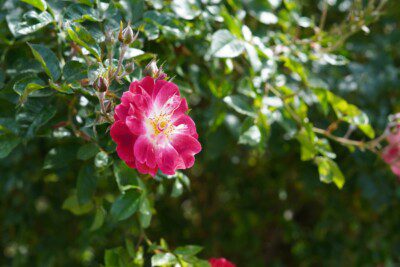
Eye-catching flowers of dark pink with a white eye cover this prolific flowerer all season. Greetings is very disease resistant and makes a good ground cover.
Oh My!
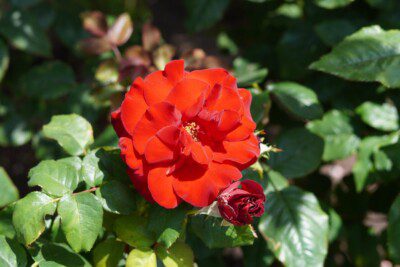
The dark red flowers of Oh My! bloom in small clusters in waves throughout the season. The velvety ruffled blossoms are shown off nicely against glossy dark green leaves. Plants have good disease resistance. The rose will perform better in cooler climates.
Section S2
Flower Girl
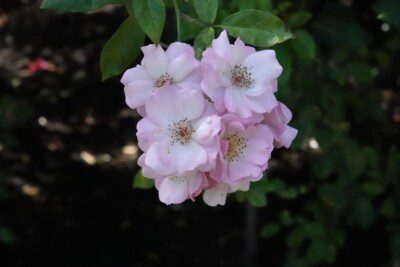
Flower Girl sports large clusters of light pink flowers with prominent bright yellow stamens. It blooms nearly continuously and is noted to be shade tolerant by some sources.
Heart 'n' Soul
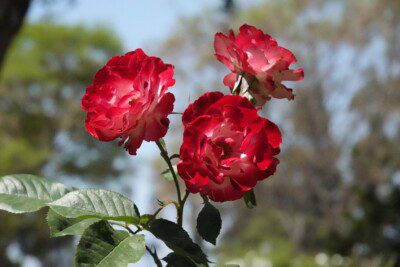
Heart n Soul is a medium sized shrub rose. Its flowers are white with red edges and grow in small clusters.
Lady Elsie May
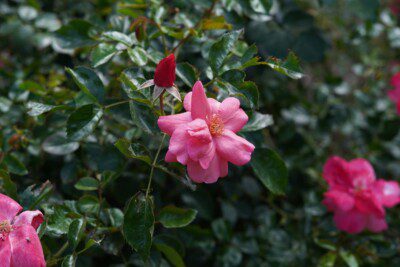
A prolific bloomer, Lady Elsie May is an older introduction that exhibits good disease and blackspot resistance. Coral pink flowers cover this compact shrub rose.
Section S3
Eglantyne
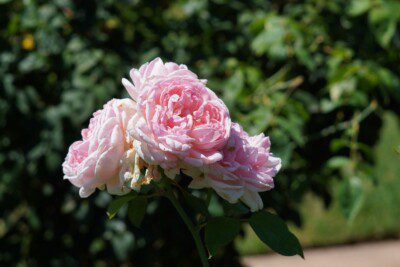
Named for the founder of Save the Children, this is another of David Austin’s winners. Eglantyne sports huge, fluffy flowers in soft pink and the fragrance is strong and classic old rose.
Gentle Hermoine
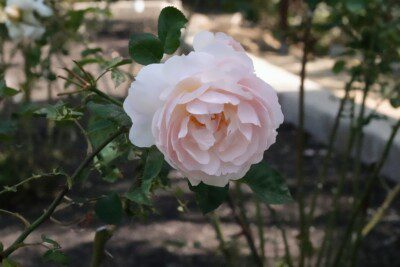
Introduced by David Austin in 2005, Gentle Hermione has large light pink flowers with masses of petals. It has a rich old rose scent. These are hardy plants and excellent repeat bloomers. The rose's name is taken from a character in Shakespeare's A Winter's Tale.
Harlow Carr
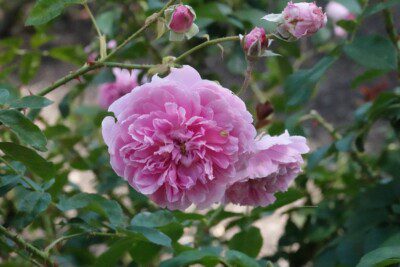
Named for a garden in Yorkshire England, Harlow Carr is an excellent repeat bloomer that will be covered with clusters of sweetly scented pink flowers all season. Its foliage starts our bronze and gradually turns green.
Munstead Wood
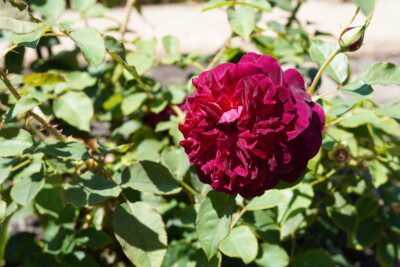
Velvety, deep crimson flowers abound on Munstead Wood, which is a prolific repeat bloomer. This David Austin introduction is named for the home of the lauded 20th century English horticulturist, Gertrude Jekyll.
Princess Alexandra of Kent
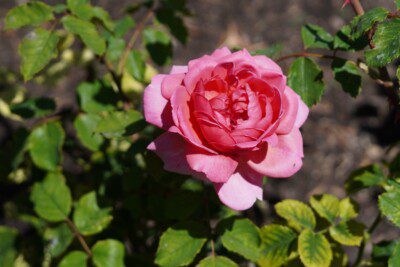
Princess Alexandra is a deep pink David Austin rose noted for its strong lemon and tea fragrance and named for a cousin of Queen Elizabeth II of England. The flowers are very large, and the plants are larger than many of the other David Austin shrub roses. This one likes it on the cooler side.
Sophy's Rose
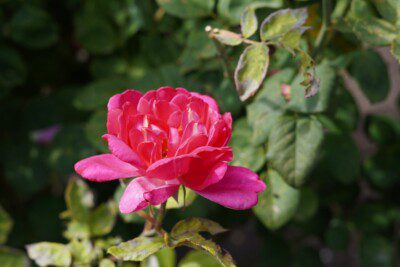
This David Austin rose variety named for Sophy Fisher, the daughter of the founder of England’s Dyslexia Institute, features a large crimson pink roses with abundant petals which increase in size from the center outward. It is a compact shrub which works well in borders and containers and it’s long stems create a sense of airy lightness
The Dark Lady
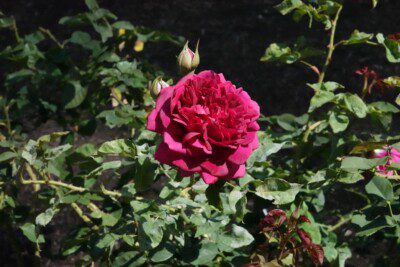
With its name taken from Shakespeare’s Sonnets, The Dark Lady was made to be a classic when it was bred by David Austin. Its densely packed petals create a ruffled appearance in the deep crimson roses which bloom in flushes throughout the year.
Section S4
Apricot Candy
Apricot Candy brings a sweet pop of coral color to the garden. Its ruffle-edged petals and spicy fragrance add to its charm while its disease resistance makes it a good performer.
Louise Hay
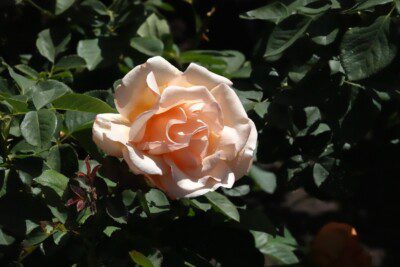
Named for an American Author, the showy apricot flowers of Louise Hay appear in flushes throughout the season.
Marmalade Skies
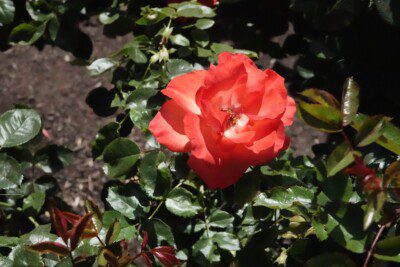
This 2001 AARS winner is a high performer, continuously covered with large clusters of tangerine flowers. Marmalade Skies will tolerate some shade.
Sparkle & Shine
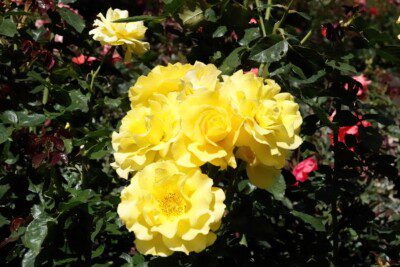
Sparkle & Shine is a cheery, deep yellow with an anise and licorice scent. The plants exhibit good disease resistance and the color resists fading.
Section S5
Icecap
Like a frozen arctic landscape, Icecap's flowers are pure white which stand out in larges clusters. It blooms repeatedly throughout the season and is highly resistant to common rose diseases.
Rainbow Sorbet
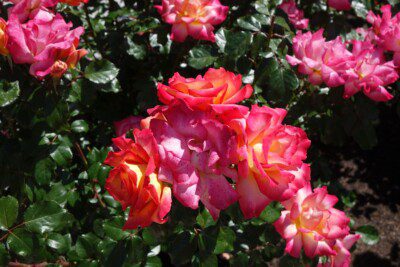
It’s a dish of sherbet in a cluster of blooms! The 2006 AARS winner, Rainbow Sorbet is a riot of pinks, oranges and yellows. It is noted to be heat tolerant and very disease resistant.
September Mourn
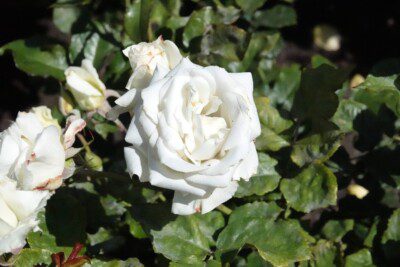
Clusters of showy white flowers abound on September Mourn. The medium height, narrow plants are very disease resistant.
Strike It Rich
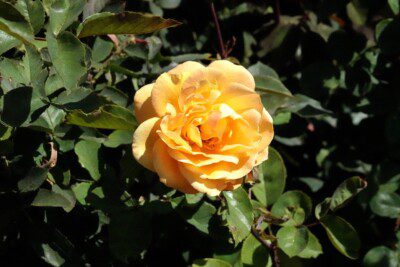
2007 AARS winner Strike It Rich is not your run of the mill yellow rose. Its golden yellow, almost apricot, petals are suffused with rosy pink. The huge flowers are richly perfumed, with hints of spice. The tall, narrow plants are vigorous growers.
Section S6
Hot Cocoa
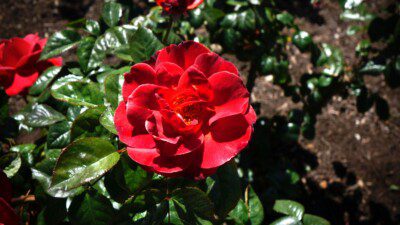
Hot Cocoa was a 2003 AARS winner and the 2006 UK Rose of the Year. It is prized for its unusual color, a rusty orange with brown undertones.
Koko Loko
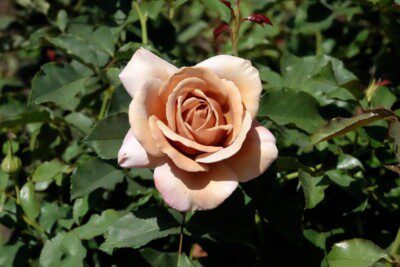
Koko Loko is impossible to mistake for any other rose. Its pale chocolate blooms finish as a soft lavender. It will be more lavender in warmer conditions. Koko Loko is described as having above average disease resistance.
Marc Chagall
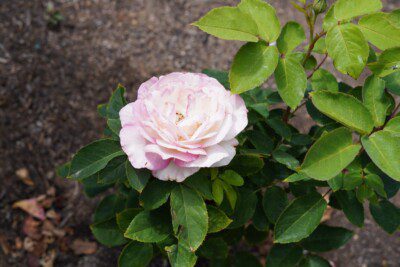
The big striped pink, cream, and yellow flowers of Marc Chagall stand out nicely against its light green foliage and are reminiscent of the roses featured in some of its namesake Russian-French artist's works. Strong disease resistance and a compact growth habit round out the advantages of this newer introduction.
Section S7
Cinco de Mayo
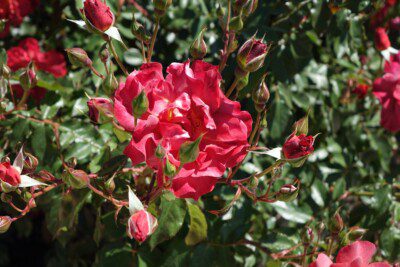
Cinco de Mayo is a offers excellent disease resistance and amazing colors. Its ruffled petals in shades of lavender, rusty reds, and pinks grow in extravagant clusters. It ws the 2009 AARS winner.
Section S8
Mardi Gras
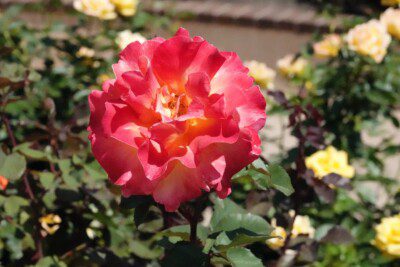
A spectacular rose, Mardi Gras was the 2008 AARS winner. Its flowers are orange-pink with yellow undertones, borne in small clusters. It is susceptible to blackspot, but resistant to mildew and rust, according to some sources. Others say it is very disease resistant.
Shockwave
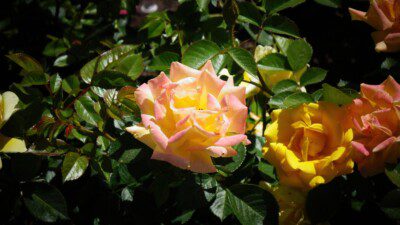
Shockwave is an intense yellow that holds its color across all climate zones. The medium-sized flowers grow in clusters. Shockwave has good disease resistance.
Section S9
Doris Day
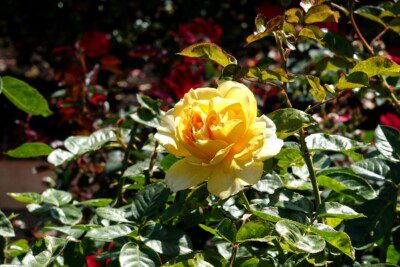
The golden yellow flowers of Doris Day are the favorite color of its namesake 20th century actress and will brighten up any garden. The large flowers are borne in clusters, with a sweet fragrance that will delight your senses. This Variety came from the same cross that produced Sparkle and Shine and Jump for Joy, also represented in the Rose Garden.
Home Run
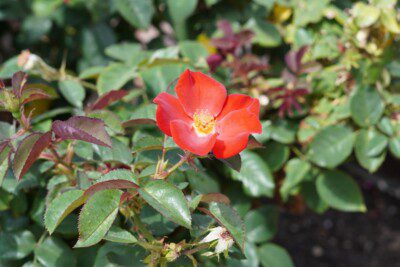
The vivid red single flowers of Home Run are reminiscent of wild roses. It offers almost continuous bloom and a short repeat time.
Love Song
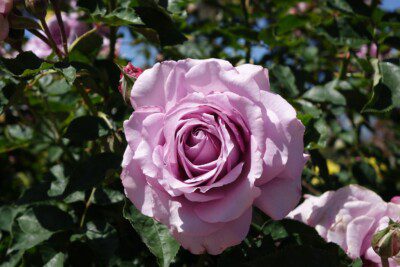
Love Song’s lavender blooms last a long time without fading. The ruffled flowers will be larger in cooler climate zones.
Sun Flare
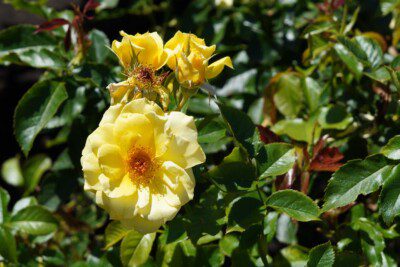
1983 AARS winner Sunflare is a lemon yellow rose. Compact plants are covered in large fragrant flowers in small clusters. It’s thorny, so be careful.
Section S10
Celebrity
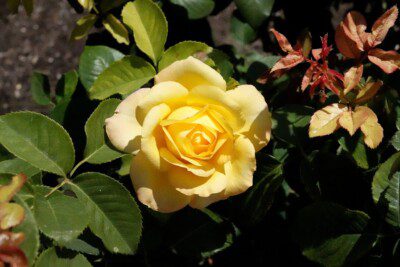
An older hybrid tea rose with large deep yellow blooms. This was one of the last hybrids developed by Ollie Weeks and it commemorated the 50th anniversary of Weeks Roses.
Gold Medal
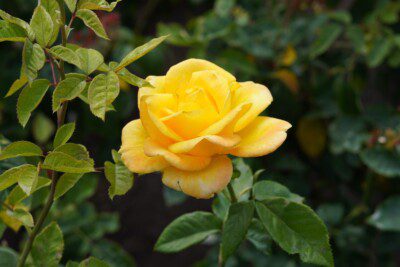
An outstanding yellow rose, Gold Medal is a hardy performer. The copper and yellow blooms age to cream. Plants are nearly thornless and heat tolerant.
Honor
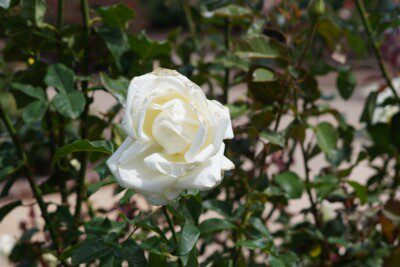
Honor is an award-winning white rose often grown for cut flowers. It was a 1980 AARS winner. (Note: roses in this public garden may not be cut or collected)
Maurice Utrillo
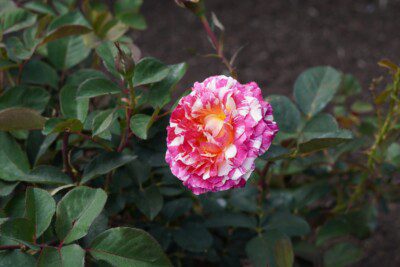
Named for a 19th-20th century French artist, Maurice Utrillo is a compact plant that will be covered with flowers splashed with reds, whites, and yellows. It has good disease resistance.
Section S11
Cherry Parfait
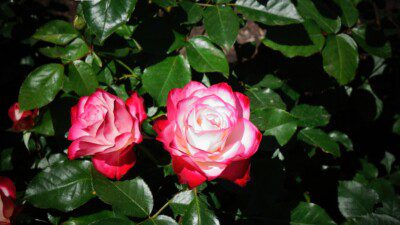
This 2003 AARS winner displays showy flowers in small clusters. The flowers are white with an eye-catching cherry-red edge. Cherry Parfait is described as extremely hardy and as a good performer across climate zones. It grows as a nicely compact shrub.
Eternal Flame
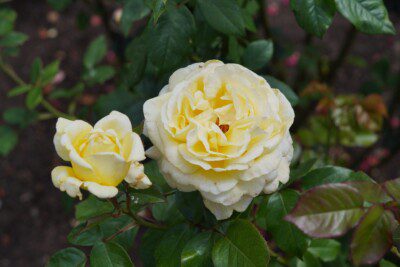
Soft yellow flowers on long stems make a pleasing contrast to the dark green foliage of Eternal Flame. This hybrid tea is great in a cutting garden or for anyone who loves the scent as much as the sight of roses. Eternal Flame is also described as winter hardy and disease resistant. (Note: roses in this public garden may not be cut or collected)
Ketchup & Mustard
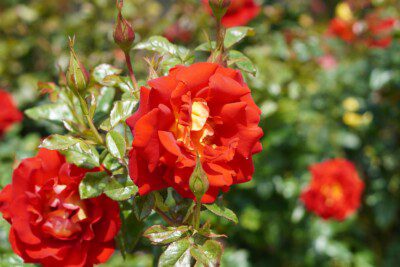
Ketchup and Mustard’s distinctive yellow petal with red reverse is unmistakable. The plants are almost thornless and the flowers grow in small clusters.
Section C1
Gold Medal
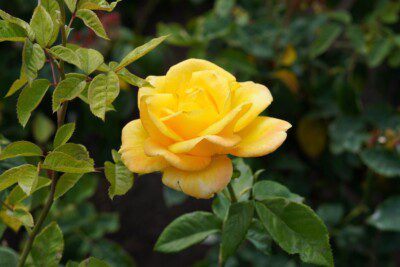
An outstanding yellow rose, Gold Medal is a hardy performer. The copper and yellow blooms age to cream. Plants are nearly thornless and heat tolerant
Peace
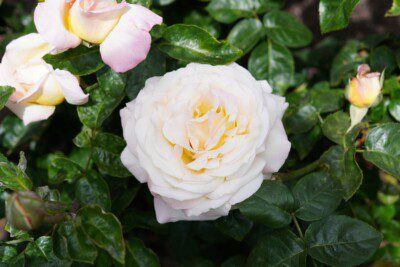
Arguably the best-known rose in the world, Peace was introduced in the United States in 1945 in celebration of the end of WW2. The huge flowers are pale yellow with pink tinged edges with an intense rose fragrance. A winner for any garden, Peace was named the Rose of the Twenty-First Century and was featured on a US postage stamp.
Ring of Fire
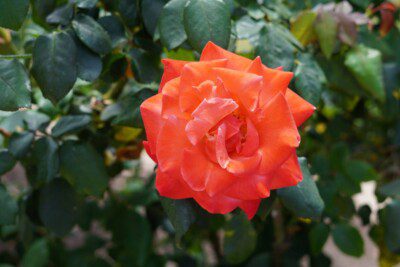
Deep orange flowers abound on this classic hybrid tea. The blooms will fade to yellow as they age. This rose gets tall, so put it in the back of the border for some high heat.
Sunsprite
Sunsprite is an older rose that still packs a punch. It is the only floribunda rose to receive a Gamble Award for fragrance. Sunsprite's compact bush form makes it a winner for smaller gardens. Its bright yellow flowers are best enjoyed in the garden as its stems are short so the cut flowers are short-lived.
Section C2A
Coretta Scott King
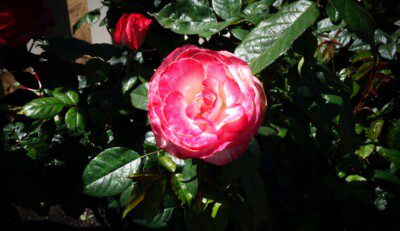
Creamy pink blossoms with coral edges celebrate civil rights activist Coretta Scott King, the wife of Martin Luther King, Jr. Flowers grow in small clusters.
Neil Diamond
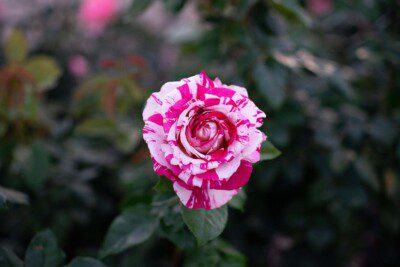
It’s easy to see why Neil Diamond is a favorite of so many gardeners. Huge striped pink and white flowers give off a strong fragrance. Named for a rock and roll hall-of-famer, this rose was bred from Rock & Roll, also featured in this garden. This is a good rose for the back of the border, as plants may reach 8 feet tall. It is susceptible to blackspot.
Rockin' Robin
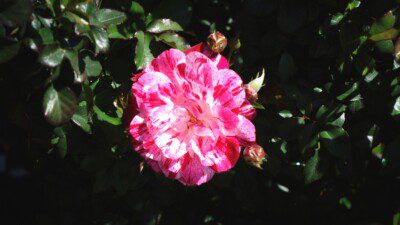
Another good choice for lovers of striped roses, Rockin’ Robin’s flowers are white splashed with pink and red stripes. It will be in continuous bloom throughout the growing season. Rockin’ Robin is a vigorous grower and quite disease resistant.
Tiddly Winks
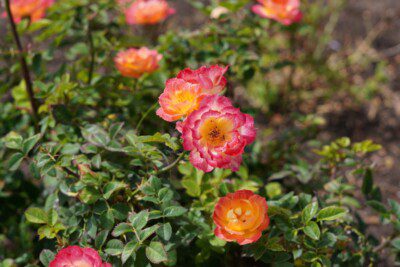
Not just another cute mini rose, Tiddly Winks is a strong performer that would do well in a patio container. Flowers are orange pink with a yellow reverse and last a long time. The colors are stronger in cooler climates.
Section C2B
Fourth of July
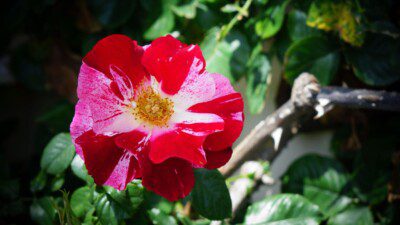
Long-lasting striped red and white blooms in large clusters grace this favorite climber. Disease resistant and vigorous, Fourth of July was a 1999 AARS winner. It can be grown as a freestanding shrub rose in cooler climates, but will require space and a sturdy trellis in warmer ones.
George Burns
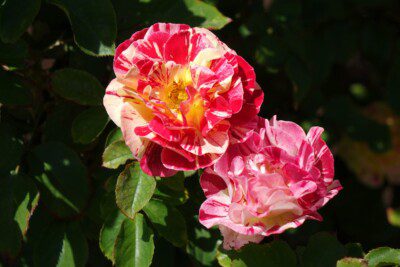
Named for the American comedian, the ruffled flowers of George Burns are beautifully striped in creams, yellows, and reds. Cooler weather will bring out the yellows. This compact floribunda is susceptible to blackspot.
Ketchup & Mustard

Calling to mind summer barbecues, Ketchup and Mustard’s distinctive red petal with yellow reverse is unmistakable. The plants are almost thornless and the flowers grow in small clusters.
Rainbow's End
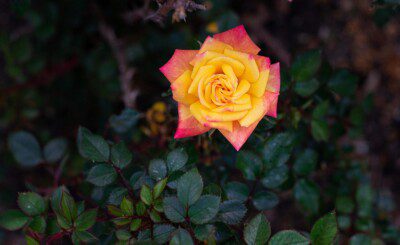
Rainbow’s End is a mini rose of golden yellow with red tinged edges. It changes color to light red as it ages. It received an ARS Award of Excellence in 1986. It is hardy to zone 5 and would look great on your patio in a container.
Section C3
Joseph's Coat
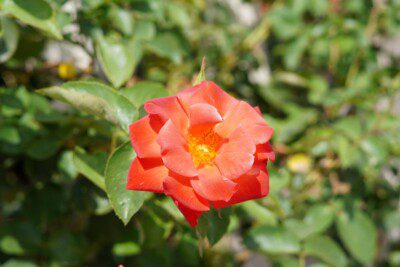
A rangy climber with beautiful multicolored orange and red flowers, Joseph’s Coat is a vigorous, early bloomer that flowers on new and old wood. It can also be grown as a shrub. As an older introduction, it is susceptible to blackspot, mildew, and rust.
Mellow Yellow
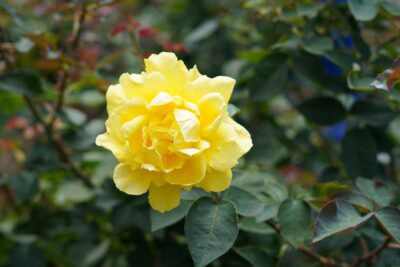
Solid yellow, no fade blooms will repeat vigorously throughout the season. Mellow Yellow has the classic hybrid tea form, with solitary flowers on long stems. This one prefers a warmer climate. It is described as healthy and a prolific bloomer.
Trumpeter
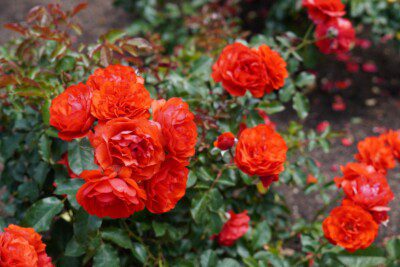
Bright red blooms on compact plants make Trumpeter a good choice for the front of a border. This one is hardy and likes some heat.
Section C4
Coretta Scott King

Creamy pink blossoms with coral edges celebrate civil rights activist Coretta Scott King, the wife of Martin Luther King, Jr. Flowers grow in small clusters.
Sally Holmes
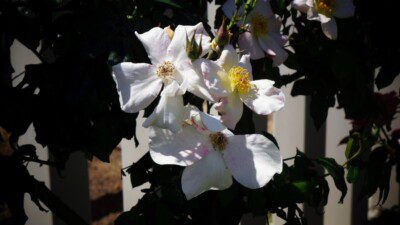
Sally Holmes, named for the wife of its breeder, is single flowered like a species rose and bears masses of cream flowers with prominent yellow stamens. It is quite disease resistant and can take some cold. This is a large shrub that can be trained as a climber.
Sunshine Daydream
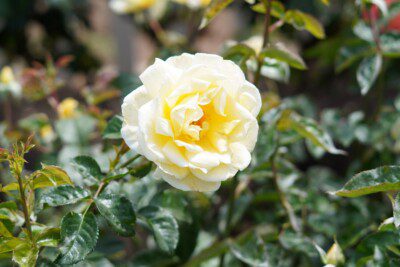
Sunshine Daydream’s light yellow flowers age to pale cream. Plants exhibit excellent disease resistance and are in constant bloom. This was the 2012 AARS winner.
Section C5
Family Holiday
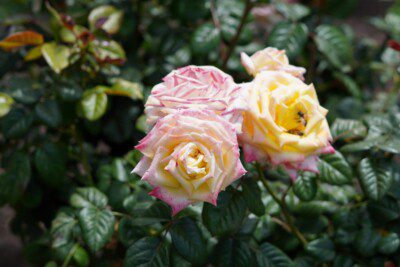
Family Holiday is a miniature rose introduced in 2014. It's edges are splashed with a deep pink which matures to a pale yellow. It may be hard to find, but its charming form and color are worth the search.
Julia Child
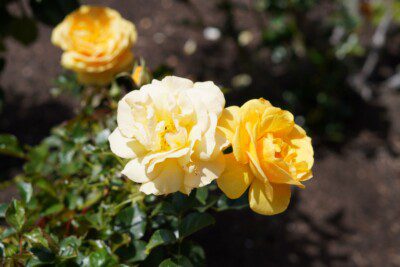
American chef and TV personality Julia Child chose this yellow rose to be her namesake, because it features three colors of yellow as the bloom matures recalling the cream, butter, and egg yolks used in much of Child's cooking. This 2006 AARS winner is a prolific bloomer. The plants are compact and very disease resistant.
Melody Parfumee
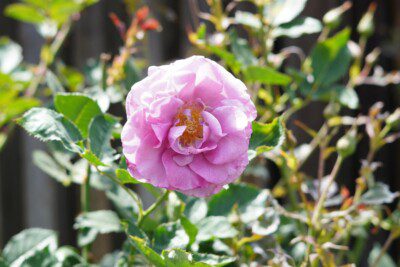
As the name implies, Melody Parfumee is renowned for its fragrance. Its deep purple buds open to purple, then fade to lavender.
Midas Touch
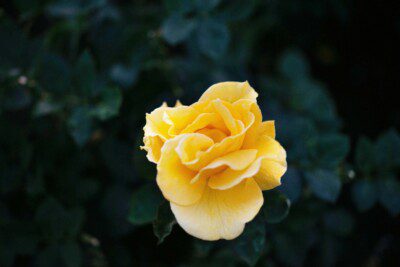
1994 AARS winner Midas Touch is a classic hybrid tea. As if turned golden by the mythical King Midas the strong yellow flowers hold their color well. It is considered a good yellow for hot climates.
Powder Puff
Large peony-like flowers in clusters of 6 to 8 dominate these compact shrubs. PowerPuff Pink has a moderate lemongrass fragrance.
Section N1
Gold Strike
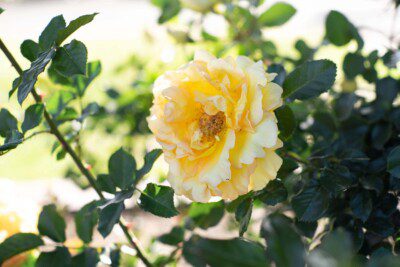
Popular with florists, Gold Strike is a clear yellow rose with a classic form.
Whisper
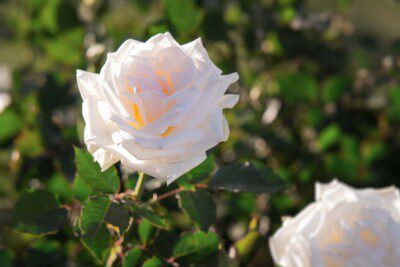
Whisper produces very large white flowers with a mild fragrance on long stems suitable for cutting. Plants are tall and upright.
Section N2
Gold Strike
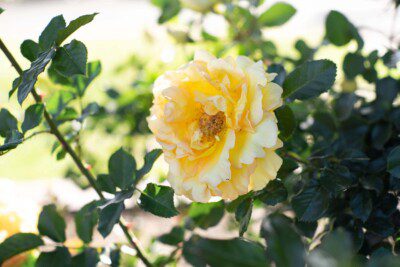
Popular with florists, Gold Strike is a clear yellow rose with a classic form.
Whisper
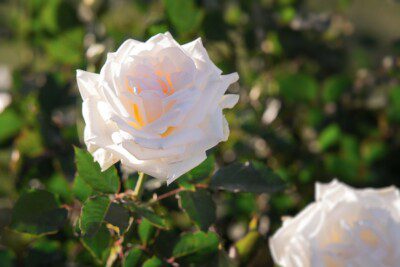
Whisper produces very large white flowers with a mild fragrance on long stems suitable for cutting. Plants are tall and upright.
Section N3
About Face
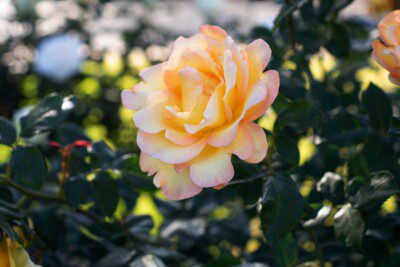
A tall, vigorous bi-color rose suitable for cut flowers, About Face was a 2005 AARS winner. About Face is unusual in that it is a reverse bi-color: the petals are dark bronze to orange on the outside and lighter gold to orange on the inside. It is described in various sources as robust. This rose (as do most roses) needs full sun and well-drained soil. Watch out for thorns on this one!
First Kiss
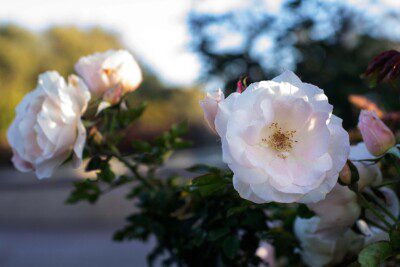
First Kiss has clusters of pink and cream flowers that fade to ivory as they age. This is described as a thorny one, so watch out.
Francis Meilland
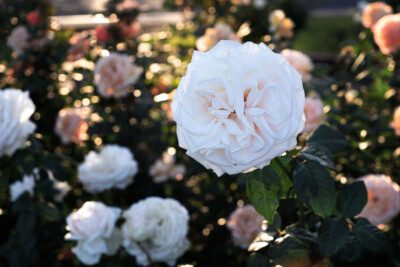
Fragrance, fragrance, fragrance. The large, soft-pink flowers of Francis Meilland are more like those of an English rose than a hybird tea, with an accompanying old rose scent. Winner of multiple awards, Francis Meilland is one of only a few hybrid tea roses to win the ADR contest in Germany, where it was found to have excellent disease resistance for its class. It is named in honor of famed rose breeder Francis Meilland, creator of the Peace rose. This rose was the last to be named an AARS winner, in 2013.
Honey Bouquet
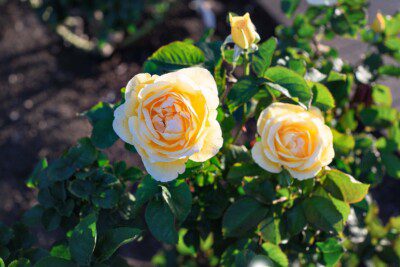
Honey Bouquet is loved for its strong sweet fragrance and its clusters of apricot-peachy flowers. It is heat tolerant and can take some shade. It does well in containers.
Walking on Sunshine
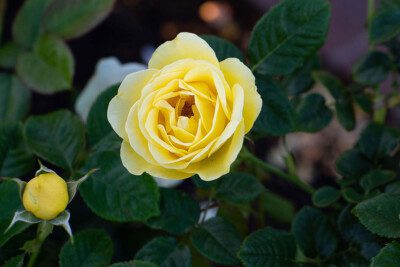
Compact and easy to grow, this beautiful yellow rose will add a touch of sunshine to any garden. This 2011 AARS winner is rust and mildew resistant and heat tolerant. It would be a great addition to a small garden.
Section N4
Crimson Bouquet
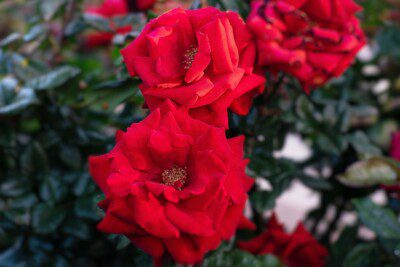
This beautiful, bright red rose was an AARS winner in 2000. It produces large clusters of flowers throughout the season. It is described by some sources as very disease resistant and highly tolerant of urban pollution.
Elle
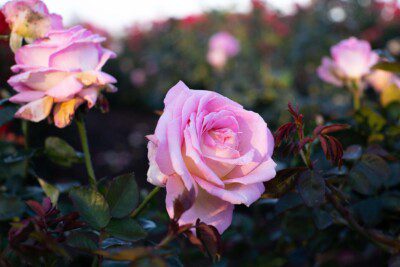
Winner of the All American Award in 2005, Elle has large, very full flowers in shades of apricot, cream, and pink. Its compact size makes it suitable for small gardens, and it does well in large containers. Elle’s lovely fragrance makes it a standout in any garden. Elle is heat tolerant and offers above average tolerance to mildew and black spot.
Frida Kahlo
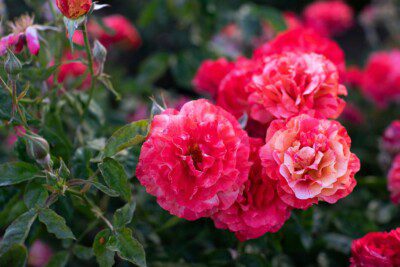
Named for the artist Frida Kahlo , this rose was introduced in 2018 and became an immediate favorite of gardeners around the world. The flowers are red with gold and yellow stripes, intensifying in color as they age. These beauties are compact, vigorous plants that do well in containers. Frida Kahlo can tolerate some shade but does best in full sun. This is one of the most photographed roses in the garden. It is in constant bloom from May to December here in San Diego.
Section N5A
Dick Clark
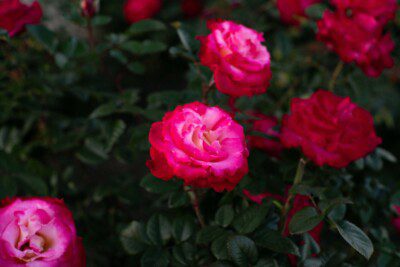
Like Cherry Parfait and Double Delight, this is a large creamy white rose with a strong pink to red edge on the petals. The plants are upright, with long stems. Dick Clark was named for an American TV personality and was a 2011 AARS winner.
Easter Basket
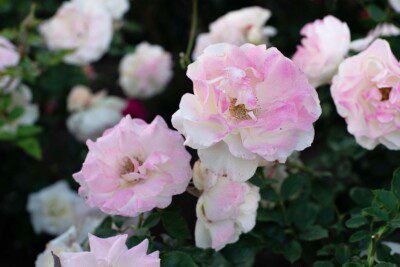
Easter Basket’s ruffled flowers of pale yellow to cream display some pink tones as well. Flowers are borne in small clusters that repeat in flushes throughout the season. Easter Basket is described as very disease resistant. Its compact growth habit makes it a good choice for hedges.
Preference
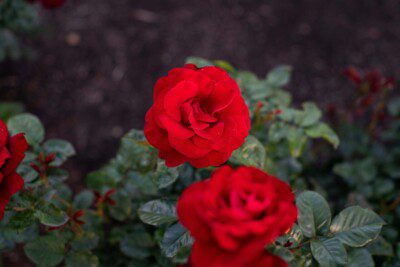
Small clusters of scarlet flowers adorn these compact, disease-resistant plants. The red is intense and does not fade. Preference is known to be thorny, so watch out!
Yabba Dabba Doo
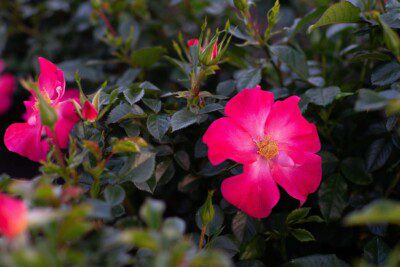
Yabba Dabba Doo is awash in clusters of coral pink flowers with prominent yellow eyes. These are short but rangy plants and prolific bloomers and prefer warmer weather.
Section N5B
All My Loving
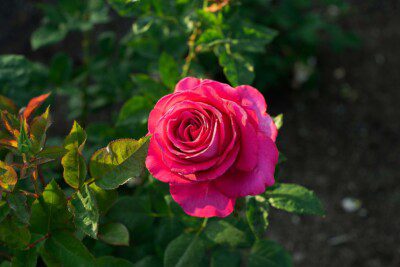
All My Loving produces large deep pink flowers on long stems, making it a great one for cut flowers. The plant has good disease resistance, and the blooms hold their color without fading.
Double Delight
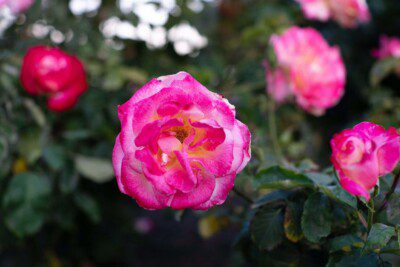
Double Delight is a favorite of many rose lovers, both for its very large, uniquely color-changing flowers and its fragrance. This 1977 AARS winner is still widely commercially available.
Jump For Joy
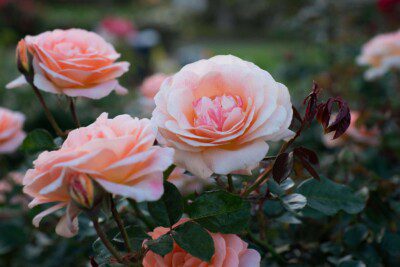
A sister to Sparkle & Shine, Jump for Joy will fill your garden with pink-peach blossoms on compact plants. Large clusters of flowers repeat throughout the season.
Section N5C
Neil Diamond

It’s easy to see why Neil Diamond is a favorite of so many gardeners. Huge striped pink and white flowers give off a strong fragrance. This is a good rose for the back of the border, as plants may reach 8 feet tall. It is susceptible to blackspot
Passionate Kisses
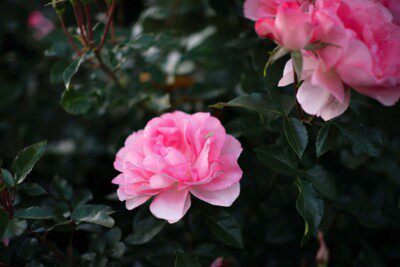
Passionate Kisses is loaded with medium-sized salmon pink ruffled flowers that remind one of peonies. It will be in continuous bloom throughout the season.
Pink Flamingo
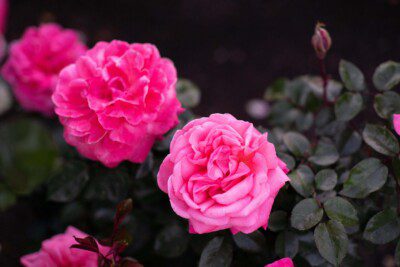
Large salmon pink flowers on a small, bushy plant make Pink Flamingo a standout. Plants exhibit excellent disease resistance and cold hardiness.
Section N6A
Barbra Streisand
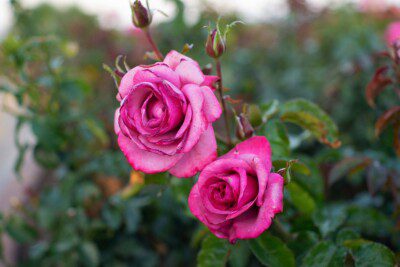
Named for the American singer and actress, Barbra Streisand is a lush lavender beauty with strongly scented flowers and tall solitary blooms. Plants exhibit good disease resistance.
Brigadoon
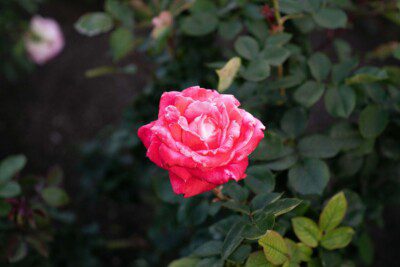
Brigadoon’s large bicolor flowers are splashed with pink and coral and contrast nicely with its dark green glossy foliage. Introduced by Jackson and Perkins, Brigadoon was an AARS winner in 1993.
Lynn Anderson
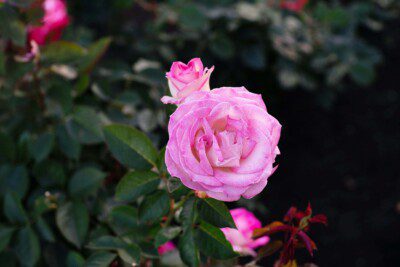
This award-winning rose sports large creamy blossoms with raspberry pink tips on long stems. Though it's namesake Lynn Anderson sang that "I never promised you a rose garden" this rose certainly promises delight.
Showbiz
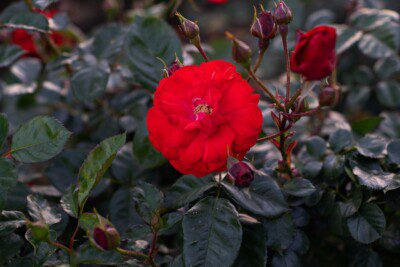
Large clusters of bright red flowers cover these compact plants during the season. Showbiz is a good one for front of the border and has excellent disease resistance. It was the 1985 AARS winner.
Section N6B
Brigadoon

Brigadoon’s large bicolor flowers are splashed with pink and coral and contrast nicely with its dark green glossy foliage. Introduced by Jackson and Perkins, Brigadoon was an AARS winner in 1993.
Easy Does It
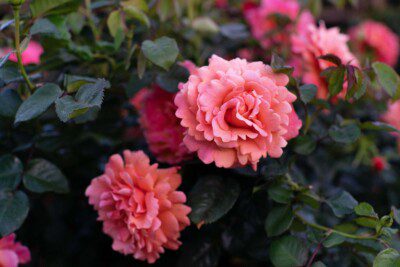
The shades of tangerine, peach, apricot, and coral displayed by this 2010 AARS winner will delight lovers of orange roses. Easy Does It’s ruffled petals stand out against glossy, light green leaves. This rose is noted for excellent disease resistance and vigorous growth.
Lynn Anderson

This award-winning rose sports large creamy blossoms with raspberry pink tips on long stems. Though it's namesake Lynn Anderson sang that "I never promised you a rose garden" this rose certainly promises delight.
Olympiad
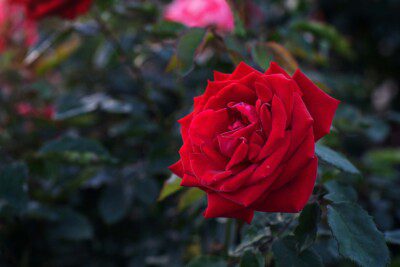
The epitome of a Valentine’s red rose, Olympiad is quite popular with florists. It has a classic hybrid tea shape and is a hardy, vigorous rose with good disease resistance and heat tolerance. It was a 1984 AARS winner.
Section N6C
Brigadoon

Brigadoon’s large bicolor flowers are splashed with pink and coral and contrast nicely with its dark green glossy foliage. Introduced by Jackson and Perkins, Brigadoon was an AARS winner in 1993.
Mother of Pearl
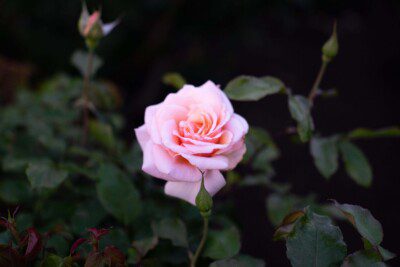
Peachy-pink ruffled blooms borne in small clusters grace Mother of Pearl all season long. It does well in a range of climate zones. It is quite resistant to blackspot.
Lynn Anderson

This award-winning rose sports large creamy blossoms with raspberry pink tips on long stems. Though it's namesake Lynn Anderson sang that "I never promised you a rose garden" this rose certainly promises delight.
Showbiz

Large clusters of bright red flowers cover these compact plants during the season. Showbiz is a good one for front of the border and has excellent disease resistance. It was the 1985 AARS winner.
Section N7
Gourmet Popcorn
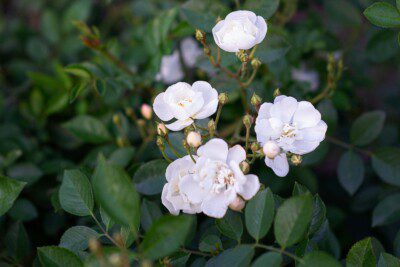
Vigorous and disease resistant, Gourmet Popcorn is a prolific bloomer that would do well in a container or small garden.
Wing Ding
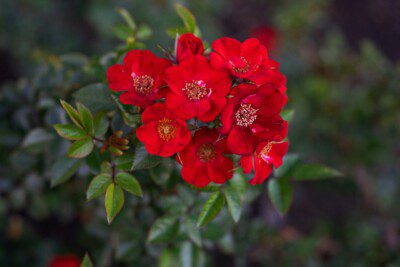
Wing Ding is the only polyantha, or dwarf shrub, rose in the Rose Garden. The small flowers are a bright orange-red and grow in large clusters. This would be a bright addition to the front of a border.
Section N8
Gourmet Popcorn
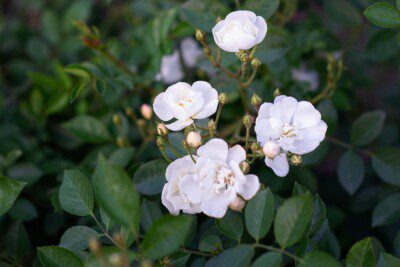
Vigorous and disease resistant, Gourmet Popcorn is a prolific bloomer that would do well in a container or small garden.
Lavaglut
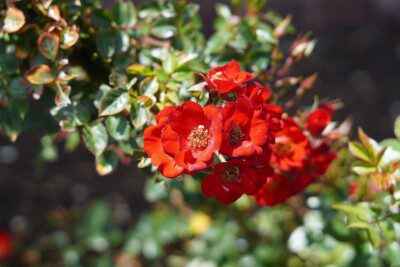
Clusters of deep red velvety blooms make Lavaglut a standout in the garden. The flowers retain their color as they age. This one is extremely heat tolerant but susceptible to blackspot.
Wing Ding
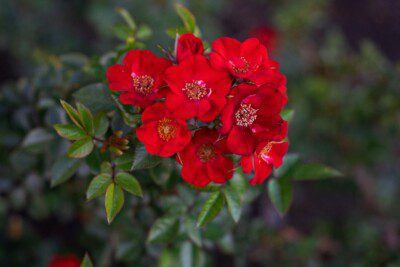
Wing Ding is the only polyantha, or dwarf shrub, rose in the Rose Garden. The small flowers are a bright orange-red and grow in large clusters. This would be a bright addition to the front of a border.
Section N9A
Fragrant Plum
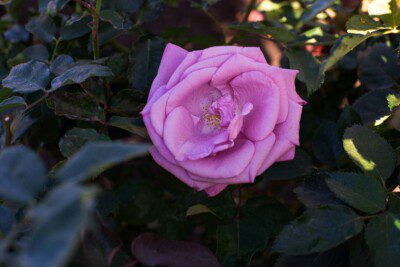
Not surprisingly, Fragrant Plum was a fragrance award winner and it's large clusters of blooms demand attention. It is described as heat tolerant.
Gilded Sun
A nice non-fading yellow rose, Gilded Sun will produce masses of flowers over the season. The plants are upright and bushy, with good disease resistance.
Uptown Girl
Uptown Girl is a striking coral rose with an old-fashioned form. Fluffy, frilly flowers in clusters of 6 to 8 blooms stand out nicely against dark green foliage. One cut stem could fill a vase.
Section N9B
Pumpkin Patch
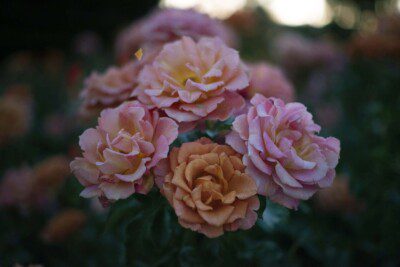
Pumpkin Patch is a striking coppery-orange rose. The ruffled petals shade from orange to russet with brown tones. It is a prolific continuous bloomer and heat tolerant.
Section N9C
Midas Touch

1994 AARS winner Midas Touch is a classic hybrid tea. As if turned golden by the mythical King Midas the strong yellow flowers hold their color well. It is considered a good yellow for hot climates.
Midnight Blue
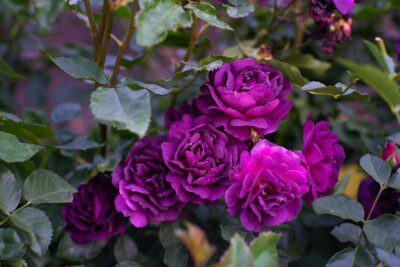
Large fragrant clusters of almost black flowers adorn this shrub rose. Midnight Blue would be an easy and attractive addition to any garden, given its compact size.
Wild Blue Yonder
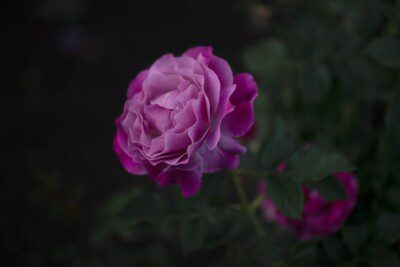
Distinctive purple tones and a strong citrus and spice scent make this 2006 AARS winner a bold choice for your garden. Wild Blue Yonder grows 4-5 feet tall, making it a good choice for the back of a garden border.
Section N9D
Apricot Drift
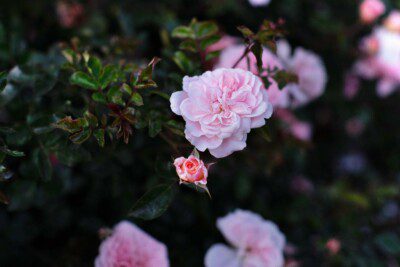
Apricot Drift is a low maintenance, easy to grow ground cover rose that blooms continuously. This little charmer would be a good addition to any small garden.
Celestial Night
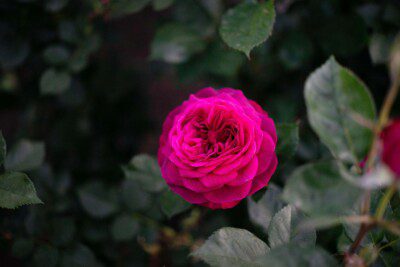
With its deep mauve to purple flowers, Celestial Night is sure to be a standout in any garden. It has extremely full cupped and quartered flowers in the style of old roses. Plants exhibit great disease resistance and are easy to maintain.
Over the Moon
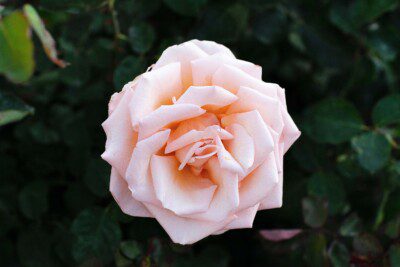
Over the Moon is a gorgeous apricot-colored rose with a mild fragrance reminiscent of apples. It does not like warm weather. The flowers are quite big, averaging 5 inches in diameter.
Section N9E
Celestial Night
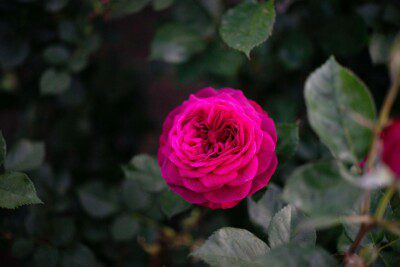
With its deep mauve to purple flowers, Celestial Night is sure to be a standout in any garden. It has extremely full cupped and quartered flowers in the style of old roses. Plants exhibit great disease resistance and are easy to maintain.
Over the Moon
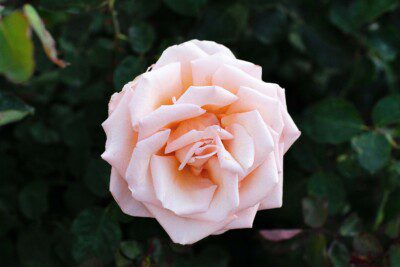
Over the Moon is a gorgeous apricot-colored rose with a mild fragrance reminiscent of apples. It does not like warm weather. The flowers are quite big, averaging 5 inches in diameter.
Rosie the Riveter
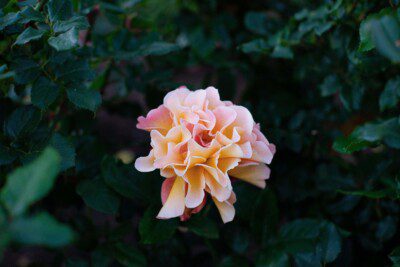
Like the hard working WW2 women it honors, the flowers of Rosie the Riveter are amazing! The colors are a riot of copper, orange and pink tones. The very full flowers grow in small clusters and have a sweet scent. This one blooms almost nonstop in the Rose Garden.
Section N10A
Make Me Blush
The flowers of Make Me Blush are reminiscent of Peace with their yellow centers and pink-cream blush. The plants are vigorous, disease resistant, and hardy to Zone 5. This is a strong repeater, so expect several waves of blossoms during the season.
Take it Easy
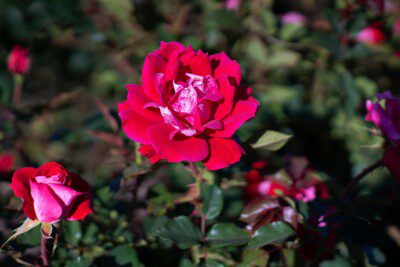
Take It Easy will be in constant bloom once it gets going in your garden. This shrub rose is vigorous and hardy, with good disease resistance. Flowers are deep red with a pink reverse, and grow in large clusters.
Section N10B
Frida Kahlo

Named for the artist Frida Kahlo, this rose was introduced in 2018 and became an immediate favorite of gardeners around the world. The flowers are red with gold and yellow stripes, intensifying in color as they age. These beauties are compact, vigorous plants that do well in containers. Frida Kahlo can tolerate some shade but does best in full sun. This is one of the most photographed roses in the garden. It is in constant bloom from May to December here in San Diego.
Painted Porcelain
This classic hybrid tea has creamy petals splashed with pink, giving it a hand-painted appearance. The flower color deepens in warmer weather. Painted Porcelain has great disease resistance and a mild, sweet fragrance.
White Licorice
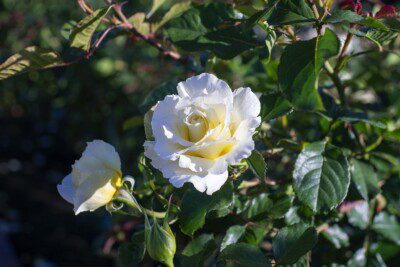
White Licorice is a blooming machine in the Rose Garden. Plants are tall and narrow, and covered in a multitude of pale yellow flowers that fade to white as they age. This one is a rapid repeat bloomer. Flowers will be more yellow in cooler climates.
Section N10C
Brilliant Pink Iceberg
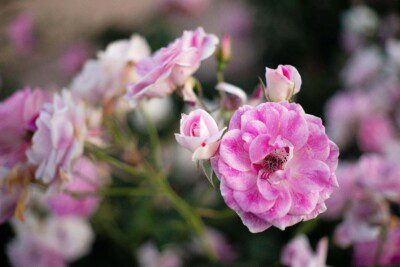
This vigorous rose is a nonstop bloomer in the Rose Garden, as are its compatriots White Iceberg and Burgundy Iceberg. The plants produce clusters of pink single and double flowers, which fade to white. It is susceptible to powdery mildew, at least in the San Diego coastal zone. This is a good choice for a spot with poor soil, as it seems to be unstoppable.
Secret
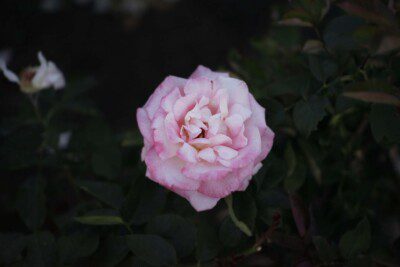
A prolific bloomer, Secret has large cream-yellow flowers tinged with pink. It is heat and shade tolerant and very disease resistant. The strong fragrance of this 1984 AARS winner is a bonus.
Section N10D
Girls Night Out
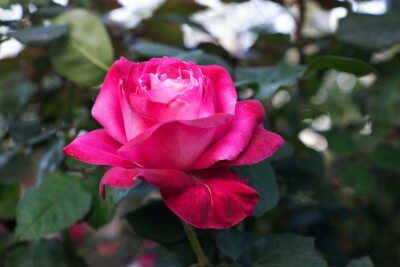
Winner of a Portland Rose Society Gold Award, Girl’s Night Out is a fragrant standout in the garden. It is extremely disease resistant. The flowers are deep pink with a lavender reverse.
Iceberg
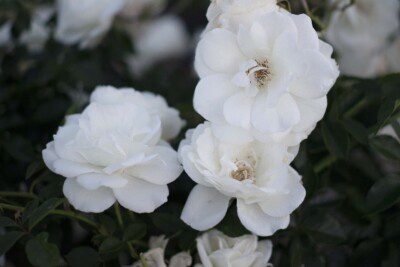
Masses of white flowers grace these hardy survivors. One of the most popular roses around the world to this day, Iceberg just won’t quit. The plants are covered in clusters of pink-tinged white flowers. It is susceptible to mildew in the Rose Garden. If you plant only one rose in your garden, it should probably be this one.
Teeny Bopper
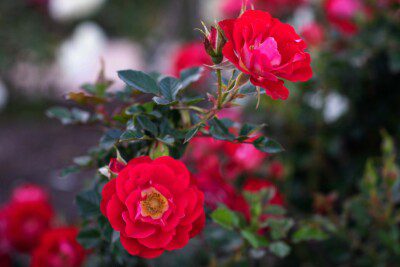
The flowers of Teeny Bopper are red with a distinctive white reverse. It is a prolific bloomer, covered with dainty flowers in small clusters. These are low plants (up to 18 inches tall) and would look good in the front of a border.
Section N10E
Brilliant Pink Iceberg
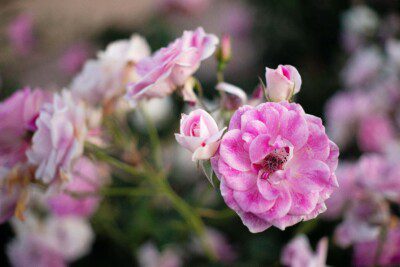
This vigorous rose is a nonstop bloomer in the Rose Garden, as are its compatriots White Iceberg and Burgundy Iceberg. The plants produce clusters of pink single and double flowers, which fade to white. It is susceptible to powdery mildew, at least in the San Diego coastal zone. This is a good choice for a spot with poor soil, as it seems to be unstoppable.
Gemini
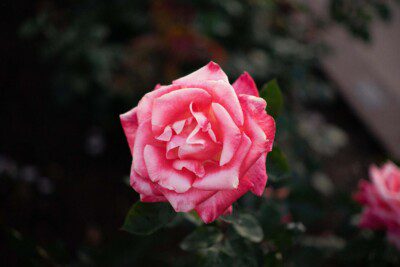
Gemini is a 2000 AARS winner and remains a popular choice for gardeners. Its sizeable flowers have creamy enters blushing to pink edges. The color of the flowers is more intense in cooler weather. This is a disease resistant vigorous grower with lovely single blooms for cutting.
Memorial Day
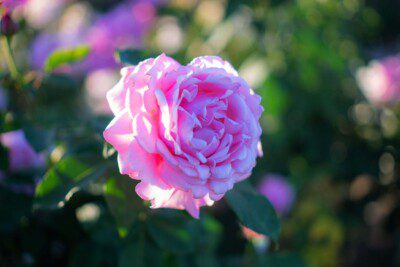
Memorial Day is a well-loved pink rose, with intense fragrance. The flowers are enormous, with one rose letting off enough scent to perfume an entire room. This one likes hot weather.
Section N10F
Firefighter
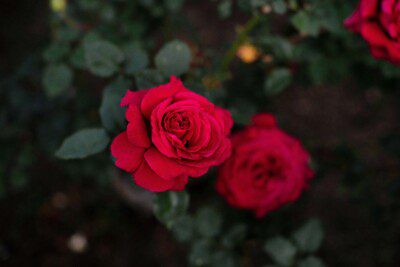
This is a popular red rose, with large, velvety flowers. Firefighter is almost thornless. It does well in hot weather and is extremely disease resistant.
Rock & Roll
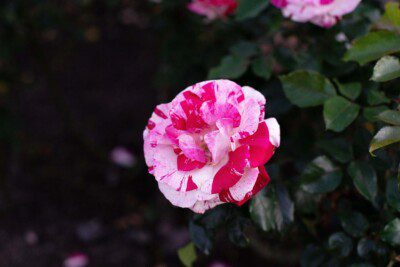
Rock & Roll is a striking rose with a strong classic rose fragrance. Its blooms are splashed with red and ivory as if Jackson Pollock got loose in your garden. Flowers will be largest in cool weather.
Section N10G
Fame!
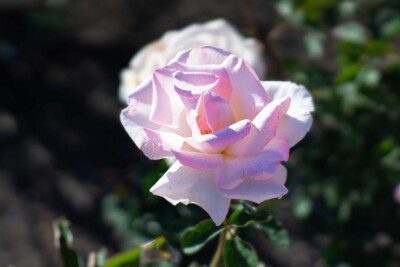
Fame! Is a 1998 AARS winner and it’s not hard to see why. Huge, deep pink blooms make a spectacular show all season long. The plants show good disease resistance as well.
Sugar Moon
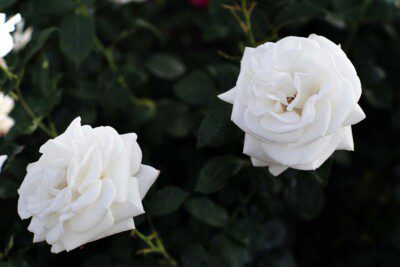
Very large, pure white white flowers on long stems make Sugar Moon a favorite for cutting. The fragrance is strong, with citrus overtones. Plants are very disease resistant. Flowers will be larger in cooler climates.
Section N11A
L.D. Braithwaite
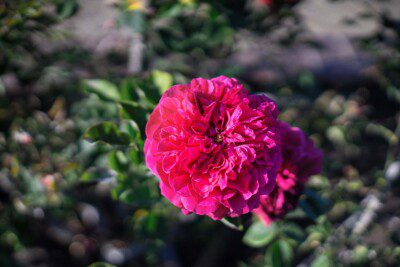
Leonard Dudley Braithwaite is a large, rangy shrub rose that will be in constant bloom during the season. Small clusters of crimson flowers provide a vivid pop of color in the garden. It is named for the father in law of the rose breeder David Austin.
Section N11B
Mary Rose
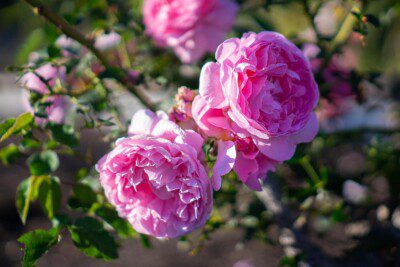
Named to celebrate the recovery of Henry VIIIs sunken flagship of the same name, this is another gorgeous David Austin rose. Mary Rose is a medium pink with a wonderful fragrance.
Section N11C
The Poet's Wife
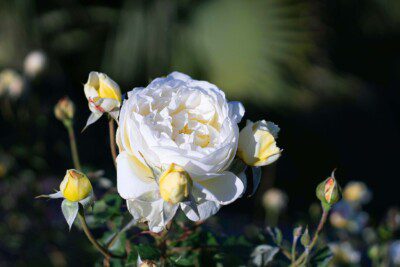
The Poet’s Wife is another highly fragrant David Austin introduction, with a strong citrus and fruit perfume. The blooms on this rose look like big pale yellow peonies.
Section N11D
Lady Emma Hamilton
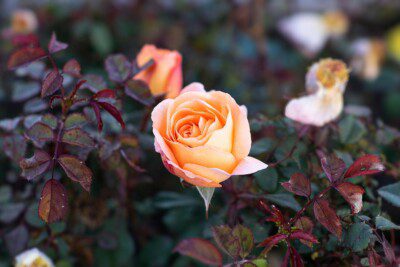
Lady Emma Hamilton is an excellent repeat bloomer, with dark red buds open to full tangerine and pink flowers. It is named for an 18th century English model.
Section N11E
Molineux
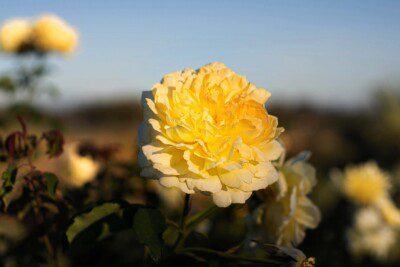
Molineux is a lovely yellow rose, tinged with orange. It is described as a reliable, excellent repeat bloomer. The compact plants can take some shade.
Section N11F
Windermere
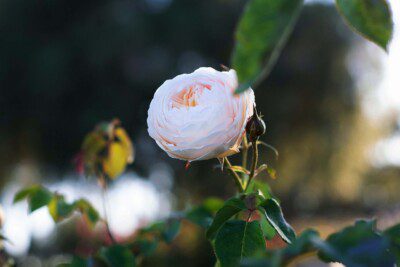
Named for the largest lake in England, the big creamy flowers fade to white on this beautiful David Austin rose. Windermere is touted as a extremely healthy rose that does well even in warm climates. The fragrance is citrus and fruit.
Section N11G
Darcey Bussell
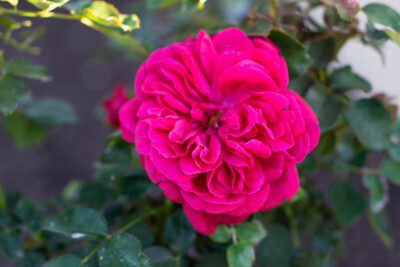
One of David Austin’s English roses, Darcey Bussell has spectacular deep pink flowers that fade to mauve as gracefully as its namesake ballerina's dances. This compact rose does well even in hot and humid climates.
Section N11H
Olivia Rose Austin
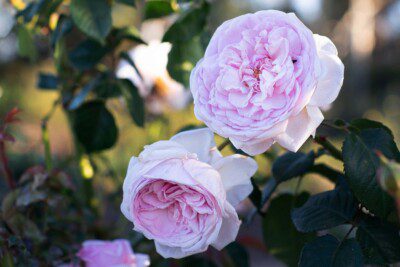
Olivia Rose Austin is a full-flowered medium pink rose in the old rose style from David Austin and named for his granddaughter. The roses have a moderate, fruity fragrance and are borne on a compact shrub. The plants are quite disease resistant and begin flowering early in the season.